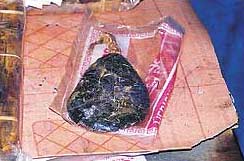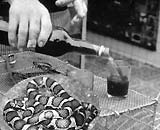Pig bile is not waste; when combined with turmeric or fresh ginger, it can treat scalp dermatitis and boils. Chicken bile helps relieve persistent coughs, while python bile treats hemorrhoids and gum inflammation.
Animal bile has been used as medicine in both modern and traditional medicine. Modern medicine primarily uses cow bile and pig bile, while traditional medicine employs bile from various species such as snakes, bears, and monitor lizards. The common chemical components of bile include cholic acid, dehydrocholic acid, cholesterol, bile salts, and bilirubin pigment. The main effects of bile are pain relief, astringent action, digestive stimulation, diuretic properties (when ingested), and anti-inflammatory, antibacterial, and wound-healing effects (when applied externally).
Pig Bile
Fresh pig bile is rarely used due to its extreme bitterness and short shelf life. It is typically processed as follows: The gallbladder is cut open, and the bile is collected in a sterilized bowl. It is then heated in a water bath and stirred until it thickens to a syrupy consistency. Alternatively, a saturated solution of alum is slowly added to the bile until precipitation ceases. The precipitate is filtered out and washed with distilled water to remove excess alum. The precipitate is placed in a ceramic dish and dried in a low-temperature oven (below 70°C) until completely dry, then ground into powder to obtain the dried extract.
Pig bile is used to treat abdominal pain, stomach ulcers, cough, whooping cough, asthma, colitis, jaundice, and gallstones, with a recommended dosage of 0.5-2 g per day of concentrated bile extract.
Syrup made from pig bile can treat whooping cough: Take dried bile extract, grind to a fine powder, mix with syrup in a ratio of 1 ml syrup containing 2 mg extract. Administer three times a day: half a teaspoon for children under 1 year; 1 teaspoon for children aged 1-2 years; 1.5 teaspoons for 3-year-olds; and 2 teaspoons for those over 3 years old.
Pills made from pig bile can help relieve constipation: Mix dried bile extract with excipients to form 0.1 g pills. Adults should take 6-12 pills daily, divided into two doses in the morning and evening before bed. For severe constipation, one can start with 20 pills on the first day and gradually reduce the dosage. Pharmaceutical Company 1 has developed Lô Đảm pills containing pig bile extract, aloe vera, and phenolphthalein for treating constipation, liver failure, and intestinal infections, to be taken twice daily, 2-4 pills after meals.
The Institute of Traditional Medicine uses pig bile extract to treat asthma. When taken with black sesame seeds, it enhances laxative effects.
For external use, raw or concentrated pig bile combined with Phellodendron amurense can be applied to treat burns; combined with turmeric or fresh ginger, it can treat scalp dermatitis and boils; and mixed with fresh onion extract, garlic, betel leaves, and chili can help heal soft tissue wounds and burns. Pig bile combined with lemongrass and guava seeds treats snake bites; with a little vinegar, it can be used as an enema for constipation relief.
Bear Bile
 |
|
Bear Bile (Image: animalsasia) |
Bear bile is considered the most valuable medicine among animal bile types, known for over 1,000 years in the East. The physician Tuệ Tĩnh previously used bear bile as an ointment for chronic hemorrhoids.
According to folk remedies, bear bile treats inflammation, pain, bruising from falls or injuries, jaundice, boils, and ulcers. A dose of 0.5 g of dried bear bile mixed with warm water should be taken 3-4 times a day. Alternatively, 0.5-1 g can be dissolved in warm water for 3-4 daily doses. Some people use 0.5-1 g mixed with 10 ml of 45-degree alcohol for massage, as ursodeoxycholic acid found only in bear bile is believed to reduce swelling and pain quickly and effectively.
To treat red, swollen eyes or pterygium, use 1-2 g of dried bear bile ground with cooled boiled water, filter, and use as eye drops daily, with a success rate of 76%. A distilled water solution containing 2-3% bear bile can also help dissolve blood quickly within 2-3 days for cases of subconjunctival hemorrhage due to injury or complications from measles, influenza, or whooping cough. Bear bile has no known side effects.
Recently, bear bile has been used to treat liver cirrhosis effectively in England, France, and Germany with the drug Urso from Axcan Pharma (USA). Some cancer cases have also been treated with bear bile in combination with other therapies such as chemotherapy, radiation, and surgery.
Snake Bile
 |
| Snake Bile is used as medicine (Image: SK & ĐS) |
This medicinal substance has a sweet and spicy flavor, not bitter like bile from other animals, and is effective for treating coughs, abdominal pain, back pain, and chronic headaches. One to two intact bile sacs can be consumed daily, either swallowed whole or mixed with a little alcohol. The “Tam Xà Đởm Trần Bì” (a classic Eastern medicine) combines bile from three types of snakes: cobra, king cobra, and rat snake, mixed with dried tangerine peel and other herbs to treat coughs, abdominal pain, and diarrhea effectively.
For treating arthritis with symptoms of joint pain and redness, especially during cold weather, some people use bile from the three snake types soaked in 25 ml of 20-degree alcohol, taken three times a day. The alcohol-soaked snake bile can also treat chronic asthma. Sea snake bile has a slightly sweet and bitter taste and serves as an anti-inflammatory, sedative, and hypnotic agent.
Chicken Bile
It helps reduce coughs, loosen phlegm, and detoxify.
For treating asthma in young children: Use bile from 10 chickens, one large turmeric root (about the size of a chicken egg), and a piece of alum the size of three corn kernels. Peel and slice the turmeric, dry it, roast until crisp, then grind to a fine powder; roast the alum and grind it into powder. Mix the chicken bile with the two powders, then combine with rice porridge to form pills the size of corn kernels. Take 10 pills before bedtime each day.
For chronic cough: Use bile from one black chicken, 10 grams of lime seeds, 10 grams of bitter melon seeds, and 10 grams of sweet flag leaves. All ingredients should be fresh, crushed, mixed with sugar, steamed, and taken 2-3 times a day.
For treating whooping cough, dry cough, and cough with phlegm accompanied by fever: Use bile from 10 chickens, 20 grams of lime seeds, 20 grams of bitter melon seeds, and 25 grams of sugar. Roast the lime and bitter melon seeds until dry, grind finely, mix with chicken bile, dry, and grind again to a fine powder. Melt the sugar and combine it with the powder to form pills the size of green beans, then dry. For children aged 1-5 years, take 2-4 grams per dose; for ages 6-10, take 5-8 grams. Administer twice daily with warm water.
Monitor Lizard Bile
It is effective for treating asthma and epilepsy. One bile sac from a monitor lizard can be divided into 5-7 doses, taken daily over a long period. In cases of children experiencing convulsions, combine 7 grams of monitor lizard bile with the juice of white guava leaves and goat’s rue leaves, applying the residue on the forehead. Monitor lizard bile combined with lime seeds and dried betel nuts, ground, mixed with alcohol, can treat menstrual irregularities.
For snake bites, mix 7 grams of monitor lizard bile, half a tablespoon of honey, 3 ml of lime juice, and a tablespoon of cooled boiled water. Mix well and drink at once.
Python Bile
It has a bitter, sweet flavor, is cold in nature, and is somewhat toxic. It can be used alone for children experiencing convulsions or mixed with sesame oil for treating hemorrhoids.
Combine 12 grams of python bile, 20 grams of almonds (peeled and trimmed), and 4 grams of roasted alum. Grind the two herbal ingredients into a fine powder, mix with python bile, and apply daily to treat painful and swollen gums with ulcers.
Fish Bile
One bile sac from a carp combined with one crushed rooster liver, soaked in 500 ml of white alcohol for 5-7 days (the longer, the better, with occasional shaking). Take two doses daily, 30 ml each, to treat erectile dysfunction. Similarly, combine one bile sac from a carp, one quail egg, and one rooster bile sac, mix well, and take all at once in a day.
Fish bile from a carp and the ash of stove soil in equal amounts should be mixed, ground finely, and applied to the neck to treat throat obstruction in children who cannot swallow.
One bile sac from a catfish burned to ash, ground finely, and mixed with sesame oil can treat uterine prolapse. Fish bile from a mackerel can be extracted and dripped into the ears to treat suppurative otitis. This should be done once a day, and usually 2-3 times is sufficient for recovery. Fish bile from a fruit should be soaked in clean cotton and applied multiple times a day to treat acute pharyngitis.
Note: Do not use common carp bile for treatment, as the therapeutic dose is very close to the toxic dose of the fish.


















































